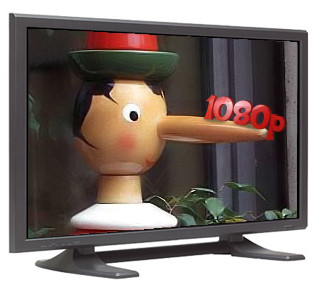1080p - Only Hype

Peter Putman of HDTVExpert.com has posted a great article about the mysteries and myths of the 1080p resolution HDTVs coming to market. The verdict? Right now, and for the foreseeable future, 1080p is a pipe dream used to hype the sale of the most expensive TVs possible.
First of all, no signal or content available plays in 1080p format. None. What about the upcoming HD-DVD and BluRay formats scheduled to launch in a few months?
If either format is used to store and play back live HD content, it will have to be 1920x1080i (interlaced again) to be compatible with the bulk of consumer TVs. And any progressive-scan content will also have to be interlaced for viewing on the majority of HDTV sets.
What about feature films or shows recorded in HDTV. Surely they are presented in 1080p, right?
There is a 1080p/24 production format in wide use for prime time TV shows and some feature films. But these programs must be converted to 1080i/30 (that’s interlaced, not progressive scan) before airing on any terrestrial, satellite, or cable TV network.
Well, surely, if the TVs coming out now can support 1080p, then the content can’t be far behind, can it? I’m sure lots of companies are recording their shows and movies right now using 1080p in 60 frames/second just waiting for the TVs sold to catch up, right?
At present, there are no off-the-shelf broadcast cameras that can handle 1080p/60, a true progressive format with fast picture refresh rates. It’s just too much digital data to handle and requires way too much bandwidth or severe MPEG compression. (Consider that uncompressed 1920x1080i requires about 1.3 gigabits per second to move around. 1080p/60 would double that data rate.)
Armed with this information, it looks like BluRay data transfer speeds aren't fast enough to even playback a 1080p movie.
We are settling into an HDTV era of 720p for high speed action and videogames at 60 frames / second, and 1080i for film. The HDTV change has been a long-time coming; it takes everyone to buy into the new standards for them to work. That includes broadcasters, producers, the film industry and consumers. Attempting to force another new non-standard down everyone’s throat before the current standard is even adopted is a bad move precipitated by TV manufacturers in an attempt to extract the greatest cost margin possible from consumers.
If you were on the fence about getting an HDTV because you were waiting to hold out for a 1080p set, just forget about it. Pick up a good TV that you can afford today knowing that 720p and 1080i are all you will need for a long time to come.
1 Comments:
Interesting article, it's not about being the best of the best, but creating a common platform.(I consider myself lucky that "the industry" chose 1080i instead of 720p).
Post a Comment
<< Home